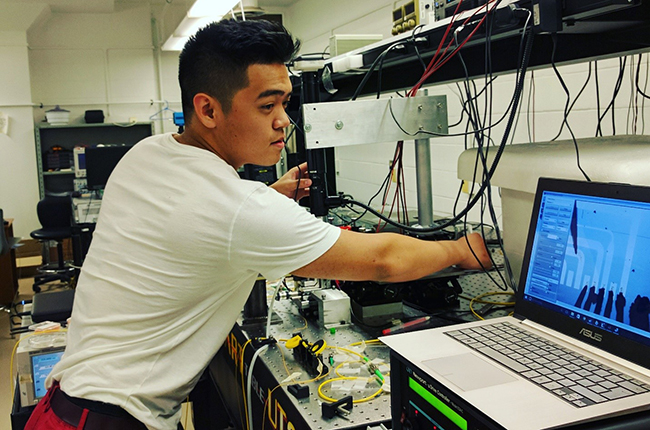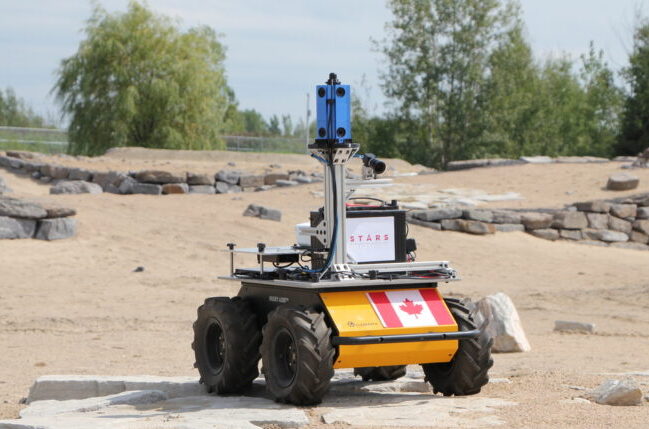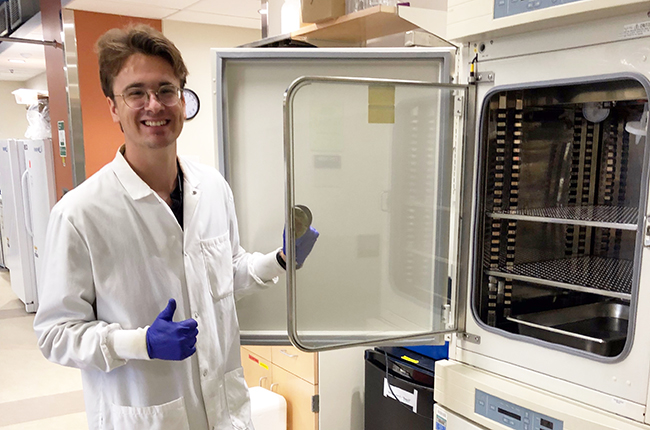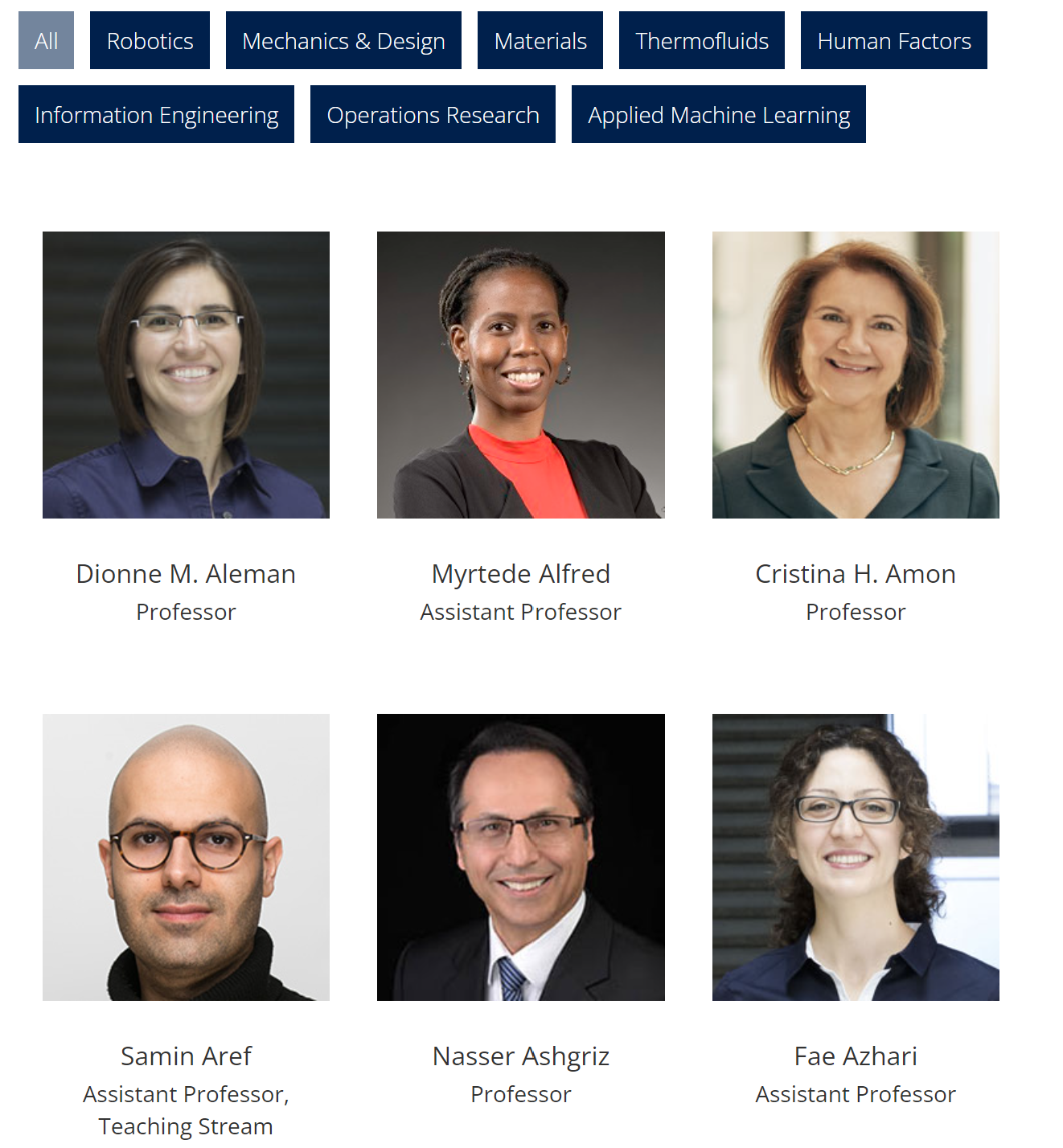For up-to-date information on the various ESROP programs, please refer to the EngSci Info Hub on Quercus. You can access it starting in September. You‘ll also receive emails about ESROP from Don Newton, Curriculum and Research Officer, in the fall.
What is Engineering Research?
Engineering research involves development, optimization, and discovery in engineering fields. It takes place at universities, research institutes, and companies that are creating innovative technologies. Despite the term, engineering research requires both theoretical knowledge and excellent practical skills to put knowledge to use.
As an undergraduate, you’ll likely be working alongside graduate students in research labs run by professors. It’s an incredible way to grow your professional network and gain technical expertise in cutting-edge areas such as artificial intelligence, regenerative medicine, autonomous robots, quantum physics, just to name a few. Even if the research relates to a field outside your area of interest, every research lab has tons of interdisciplinary responsibilities, and you may find yourself interested in new endeavors. From working on machine learning for a civil engineering lab, or autonomous robots for material discovery, research is all about exploring, keeping an open mind, and both personal and scientific discovery.


Research opportunities in labs are often posted similarly to internship opportunities. Postings include a project description, profile of the ideal candidate, and details of the opportunity and the application process. More importantly, we encourage you to talk to professors and teaching assistants to learn about their research and ask directly whether their labs have openings. Be proactive, since professors expect to be approached. EngSci hosts info sessions in the fall that’ll teach you how to write a “cold” email (i.e., writing to a person who may not know you), among other things.
Engineering Science is an academically rigorous program that explores various advanced concepts through its curriculum. EngScis are therefore well-equipped for careers in both industry and academia/research. Regardless of the field they ultimately enter, a lot of EngScis take part in research at some point during their degree.
Why Research?
Upper-year EngScis have spoken with Professor Arthur Chan, Associate Chair, Year 3 & 4 for the Division of Engineering Science. These were some of their takeaways about the value of research in Engineering Science.
By the very nature of a lab environment, you’ll be constantly learning. Often during research, you’ll be asked to read and summarize scientific papers, or improve your understanding of a subject. This is unique, as typical student summer jobs don’t include as much active learning. You’ll also become an expert in one specific topic: the subject of your research.
Although research and industry are presented as two distinct paths after graduation, they’re not. Both give you highly transferable skills that are valued broadly. Those with industry experience are valuable in a research setting because they understand how innovation in a lab could be brought to market. In industry, those with research experience are perceived to be at the forefront of development in their field, and often as creatives or innovators; people with research experience are in high demand in many companies. Research will distinguish you as a curious, passionate, or ambitious student who is excited about advancing your knowledge and abilities. EngSci is all about being multidisciplinary. It’s worth working in industry before you decide to pursue a career in research, and it’s worth trying research before pursuing a career in industry. You can easily get experience in both areas during your time at U of T.
How EngSci Prepares you for Research
In addition to EngSci-exclusive research opportunities (read more below), the program itself is designed to prepare you for grad school and research.
In EngSci’s specialized majors and coursework you’ll learn advanced, discipline-specific concepts that give you a foundation for graduate studies and research. The multidisciplinary curriculum exposes you to many different research fields, giving you a broad perspective and skillset.
All fourth-year EngScis are required to complete an undergraduate thesis. This is an independent engineering research project in which you conduct a deep investigation into a particular advanced field of interest. Your thesis will give you an excellent foundation for research.
From ESC180/190 and CIV102, all the way to your 500-level upper-year courses, you’ll have plenty of project-based courses throughout your EngSci journey. These projects will provide you with invaluable practical experience that can strengthen your grad school/research applications.
What are Research Fellowships?
Research fellowships are financial awards offered by organizations outside of EngSci (e.g. government agencies, professional organizations, etc.) that support undergrads doing research. You apply to them like you would for a scholarship, but instead of helping you pay for tuition, these awards specifically fund your summer research. They’re an important part of your research funding, with the rest coming from your supervising professor. Some professors require you to secure a research award before taking you on as a summer researcher.
It’ll be your responsibility to identify and secure labs/professors to work under. After that, you can apply for various fellowships with the approval of your professor.
Summer research fellowships usually span 12-16 weeks between May and August. Some labs will have part-time openings during the academic year (which may or may not be paid).
Non-ESROP Research Fellowships for EngScis
As a first-year EngSci, you can apply for many different research fellowships. The EngSci Info Hub and EngSci Newsletter will notify you of opportunities, that’ll likely be of greatest interest to you. You can also view U of T’s Undergraduate Research Hub for a full list of university-wide opportunities; there are some other opportunities such as the U of T Centre for International Experience Summer Research Exchange Program.
Note: the exact details of some of these fellowships may be subject to change for the upcoming academic year. Please refer to the EngSci Info Hub for updated information.
- Details: Support first years in their engineering research
- Eligibility: Must be a first-year engineering student and a Canadian citizen, permanent resident, or visa student with valid student visa for the duration of the fellowship
- Logistics: Applicant must first find a potential faculty supervisor for their research activities
- Award: $7000, with further funding at the discretion of the supervisor
- Application Components: ACORN academic history, resume, statement of personal research interests, project description (to be completed by supervisor)
- Dates: Application closes around early March; applicants will be notified in April, research will occur between May and August
- Details: Support undergrads in research projects that are co-supervised between two U of T faculty members, where at least one faculty member is from the Faculty of Applied Science & Engineering
- Eligibility: All undergrad students both domestic and international. International students must hold a valid student visa for the duration of the fellowship
- Logistics: Applicant must first find two potential faculty supervisors for their research activities with at least one supervisor being from FASE
- Award: $6000, with supervisors contributing an additional $2000, for a total of $8000
- Application Components: ACORN academic history, CV, application form with project description (to be completed by supervisor)
- Dates: Application closes around early March, applicants will be notified in April, research will occur between May and August
- Details: Support undergrads in research projects related to natural sciences and engineering
- Eligibility: Second-year students (and above) with a cumulative average of at least B- who are Canadian citizens or permanent residents of Canada
- Logistics: Students must find a faculty supervisor from an eligible Canadian university, and then complete the NSERC application
- Award: $6000, with the supervisor contributing at least $1500, for a total of $7500
- Application Components: ACORN academic history (if applying with a U of T faculty member) or official transcript (if applying with a non-U of T faculty member) and applicant’s basic personal information. The supervisor will then be contacted to complete the rest of the application
- Dates: Deadlines will vary based on the home department of the faculty member with which you are applying. Deadlines can range from January to March. Research will occur for at least 16 weeks between May and August
- Details: Provide undergrads with research experience in the natural sciences and engineering, social sciences and humanities, and health and life sciences
- Eligibility: Students with a cumulative average of at least B+ who are Canadian citizens, permanent residents, or visa students with a valid student visa for the duration of the fellowship
- Logistics: Students must find an eligible U of T faculty member
- Award: $5250, with the supervisor contributing at least $2250, for a total of $7500
- Application Components: ACORN academic history, applicant’s basic personal information, and supervisor-completed form including details of the research project
- Dates: Application closes around early March. Research will occur for 14 weeks between May and September
- You might be interested in research opportunities offered at other institutions. Such opportunities may include other discipline-specific U of T Engineering research programs such as the TRANSFORM HF Undergraduate Summer Research Program, Acceleration Consortium Summer Undergraduate Research Program in Accelerated Discovery, machine learning research internships at the Vector Institute, or even programs at other universities such as a summer undergraduate Research Fellowship at Caltech
- Some of these opportunities may be posted in the EngSci Info Hub on Quercus, but you may need to look for some of them yourself. Regardless, there are tons of other research opportunities tailored to various interests, and we strongly recommend you do your own searching!
- Pathways to Science has an incredible search portal for finding opportunities in any discipline (especially STEM) across the United States
Engineering Science Research Opportunities Program (ESROP)
ESROP is an EngSci-exclusive program designed to give EngScis the chance to participate in cutting-edge research early in their academic careers. Through ESROP, EngScis can conduct research at U of T and renowned institutions around the world. It’s incredibly rare for a program to offer research opportunities at this scale for first- and second-year students. ESROP research opportunities occur during the summer after first, second, or third year. All you need is ambition, a passion for learning new things, and a strong written application to potentially secure an amazing research fellowship! Read more about previous ESROP students’ experiences and stories here.
ESROP – U of T and ESROP – ExOp (Exceptional Opportunities) are student-driven programs designed to support research opportunities for EngScis. To qualify for the programs, students in first and second year independently reach out to professors and researchers. Once students have found a research group that is keen to take them on for the summer (and willing to match the financial stipend from ESROP), they can apply to ESROP – U of T or ESROP – ExOp, depending on whether the research group is at U of T or elsewhere. Successful applicants will qualify for funding from EngSci in addition to compensation provided by the lab throughout the summer.
ESROP – U of T students work at some of the university’s finest research labs at the Institute for Aerospace Studies (UTIAS), Institute for Biomedical Engineering (BME), Department of Computer Science, Robotics Institute, and much more. ESROP – ExOp students have worked at labs in Caltech, Harvard, University of Tokyo, University of Waterloo, and more. Note that there are many ESROP – U of T awards given out each year, but very few ExOp awards.

In ESROP – Global, students apply for research positions at specific host institutions partnered with U of T EngSci (information about the specific institutions, available research projects, and eligibility requirements will be posted on the EngSci Info Hub in November/December). Successful applicants are sent to their preferred research institution along with funding for their summer research. Destinations include top universities in Germany, Japan, New Zealand, Singapore, Thailand, United Kingdom, United States, and more! Through ESROP – Global, students participate in cutting-edge research while getting the chance to exit their comfort zones and explore a new country and culture; international perspectives are very valuable as an engineer. Past students have had fantastic travel and research experiences. Here’s one ESROP – Global story from an EngSci!
“This summer, I had the opportunity to pursue research for ESROP – Global at the National University of Singapore. My work focused on enhancing the detection of atopic dermatitis, a common skin condition often misdiagnosed as other diseases due to its visual similarities. Our proposed solution was a technique called Electrical Impedance Spectroscopy (EIS), which measures the skin’s resistance to alternating currents to provide a more accurate diagnosis. By developing mathematical models for EIS and learning to effectively present our findings, we aimed to give medical professionals a valuable additional tool for diagnosing skin conditions. Beyond the research, Singapore’s location offered us a unique chance to travel. Following our supervisor’s advice, we worked on weekends and used some weekdays for exploring neighboring countries, taking advantage of less crowded travel periods and competitive rates for transportation and accommodation. This approach allowed us to experience diverse cultures, visit historic sites, and make the most of our time abroad alongside our work. My experience with ESROP Global was enriching both academically and personally, proving that sometimes, the most impactful learning happens outside the classroom!”
-Victor Weng, EngSci 2T7
E4TW channels the global nature of the EngSci program and allows students to participate in research projects related to the social, ethical, political, and human rights impacts of technology. Research projects are generally led by The Citizen Lab based at the U of T Munk School of Global Affairs & Public Policy.
Tips when Applying for Research Opportunities
For a complete catalogue of tips, view the EngSci Info Hub’s “Research” page. There will also be information sessions hosted in the Fall; read the EngSci Newsletter to stay up-to-date.
As a first-year EngSci, you probably haven’t yet narrowed down what specific research you want to do. This is completely okay, since undergraduate research is your opportunity to explore different research areas and identify topics which most excite you. The best thing you can do is to keep an open mind to various opportunities and gain some sense of your interests. Maybe there are some specific concepts into which you’d like to dive deeper, such as genomics or fluid dynamics, or some fields/industries that you’d like to explore, such as autonomous vehicles or material science. While it’s important to know your own interests and articulate them well, it’s also valuable to have an open mind and be willing to explore a field you’d not previously thought of. You never know what surprising interests you might develop!
Much like with finding internships, you cannot expect the opportunities to magically appear on a golden platter; you need to do your own searching. The EngSci Info Hub will be an excellent place to start for U of T-related placements. If you’re looking for opportunities at another institution, the best method is to check that institution’s website. If you have a specific type of opportunity in mind but don’t know where to find it, look at the websites of some top research universities and see if their programs match what you’re looking for. Most importantly, talk to your professors to learn about their research! They all have connections to researchers and companies around the world, so ask them whom they would recommend for work in an area that interests you. Note that some universities will limit their program offerings strictly to students enrolled at that university, and programs in the United States might restrict programs to American citizens or permanent residents.
Reaching out to professors can seem intimidating but learning how to do this will greatly increase your chances of landing a summer research position.
University departments list all their professors in faculty directories, often grouped by research focus. Once you’ve found research areas that interest you, read more about the work of each faculty member on their personal or lab website. Read a couple of their publications to gain a stronger understanding of the type of work that they do, so you can potentially identify specific research interests related to their work. You can also view a list of past lab members, which may or may not include undergrad researchers; feel free to reach out to them on LinkedIn or U of T Engineering CONNECT to enhance your understanding of the type of work you might do.
Remember that professors may have specific instructions that you must follow if you want to contact them for research (that could be as subtle as writing a specific email subject line), and always practice professionalism when reaching out to professors.
Emails to professors are like mini cover letters. They will typically include a brief introduction of yourself along with some of your research interests, and how your past experiences enhance your interests and make you an excellent candidate for the lab. You should also attach your résumé and academic history. If they don’t respond to your email after at least one week, send a follow-up; professors are busy and it’s not uncommon to receive no reply at first.

Sometimes when reaching out to professors or applying for research internships, you’ll have to write a research statement; these differ from traditional cover letters in that they’re more academically focused as opposed to explaining how your past experiences make you a good fit for a job. When you reach out to professors, you might write a mix of a research statement and cover letter; other research internship programs may require a more formal document. There are tons of online resources to help craft your perfect research statement.
